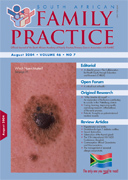Caring, learning, improving quality and doing research: Different faces of the same process.
Abstract
The aim of this article is to describe the similarities between the consultation process, the quality improvement (QI) process, action- and problem-based learning and participatory action research (PAR). We feel this understanding adds value to our work in enabling personal development as practitioners, fostering teamwork and demystifying the different concepts. Learning to understand the different processes becomes easier, as they have a lot in common. All four of these spiral processes follow a number of steps. They start with building a relationship/team with a patient, students, co-workers or co-researchers. The next step is identifying the problem. The present situation, as well as the required state (setting standards), is identified. An intervention can then be planned, with a follow-up evaluation to see if the situation has improved. The spiral may continue with a follow-up plan. As authors we believe that we can conclude from this that health workers, teachers, managers and researchers can learn from each other and work together more readily if they understand that they share a common action process. (SA Fam Pract 2004;46(7): 26-29)
Published
2004-08-01
Section
Original Research
By submitting manuscripts to SAFP, authors of original articles are assigning copyright to the South African Academy of Family Physicians. Copyright of review articles are assigned to the Publisher, Medpharm Publications (Pty) Ltd, unless otherwise specified. Authors may use their own work after publication without written permission, provided they acknowledge the original source. Individuals and academic institutions may freely copy and distribute articles published in SAFP for educational and research purposes without obtaining permission.

